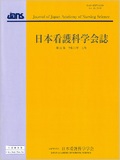Japanese
English
- 販売していません
- Abstract 文献概要
- 参考文献 Reference
- サイト内被引用 Cited by
要旨
目的:新型コロナウイルス感染症(COVID-19)禍で市区町村保健師が重視している地域保健活動方法について記述統計を用いて明らかにし,COVID-19禍での市区町村保健師の活動について示唆を得る.
方法:地域保健活動方法について市町村保健師を対象にした面接調査より作成した78項目の地域保健活動方法について,682市区町村の保健師各1名に質問紙調査を実施した.
結果:270人(有効回答率39.6%)を分析対象とした.集計の結果,COVID-19禍で重視するようになった上位5位の地域保健活動方法は,「内容や回数を減らし事業を継続する」「NDB,KDBや介護DB等のデータを活用する」「ICTを活用した保健事業を実施する」「重点活動のために,その他の事業を整理する」「さまざまな機会を活用して住民の健康状態を把握する」であった.
結論:市区町村保健師は,対面での支援が制限される中で事業を継続していくための地域保健活動方法を重視していた.
Aim: To gain insight into the community health activities of municipal public health nurses (PHNs) during the novel coronavirus disease 2019 (COVID-19) pandemic by using descriptive statistics to identify community activity approaches that these PHNs considered important during the pandemic.
Methods: We listed 78 community health activity approaches as questionnaire items. The approaches were based on an interview survey of municipal PHNs. We then conducted a questionnaire survey on the approaches with PHNs in 682 municipalities, selected by using stratified random sampling after classification of the municipalities across Japan into six groups by population size. In one municipality, one PHN responded to the survey.
Results: Data from 270 public health nurses were analyzed (valid response rate: 39.6%). The calculated results revealed that the top five community health activity approaches that the PHNs came to consider important during the COVID-19 pandemic were: “continue projects while reducing their content and frequency,” “utilize data such as the NDB (the national database of health insurance claims and specific health checkups of Japan), KDB (kokuho [national health insurance] database), and long-term care database,” “implement health projects by utilizing ICT,” “downsize other projects in order to implement priority activities,” and “gain an understanding of the health status of residents by making use of various opportunities.”
Conclusion: Municipal PHNs placed emphasis on community health activity approaches aimed at continuing projects under circumstances where face-to-face support was restricted.
Copyright © 2021, Japan Academy of Nursing Science. All rights reserved.


